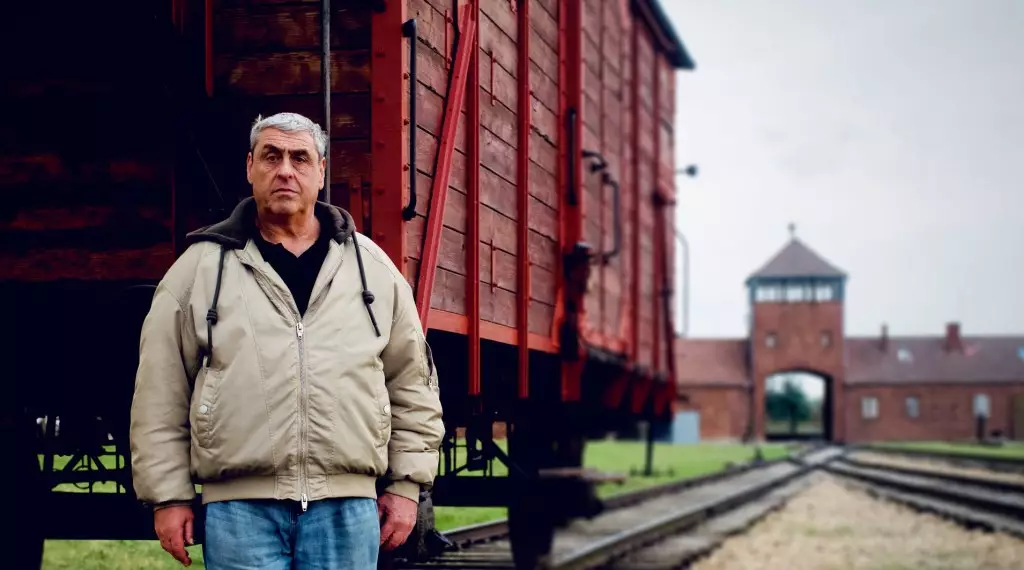The upcoming documentary film, *The Tattooist’s Son: Journey to Auschwitz*, offers a profound exploration of personal heritage intertwined with historical trauma. Following the acclaimed *The Tattooist of Auschwitz* drama, which drew inspiration from the life of Holocaust survivor Lali Sokolov, this new project promises not only to provide insight into the Sokolov family’s experiences but also to engage audiences in the broader conversation surrounding the Holocaust and its lasting impact on subsequent generations.
At the heart of this documentary is Gary Sokolov, the only child of Lali and Gita Sokolov, whose poignant love story served as the dramatic foundation for the docudrama. The film chronicles Gary’s journey to Auschwitz, a place laden with history and emotional significance. This pilgrimage signifies not just a physical journey but a deeply personal quest for understanding and closure. As Gary ventures through sites pivotal to his parents’ lives, viewers are invited to reflect on how profound trauma shapes identities and relationships across generations.
It is noteworthy how this documentary intertwines individual narratives with collective memory. By tracing his parents’ harrowing past, Gary embodies the notion of intergenerational trauma, a term that refers to how the experiences of one generation—especially those concerning violence, discrimination, or persecution—can resonate and manifest in the lives of their descendants. Gary’s exploration of his family’s story presents an urgent reminder of the need for reckoning with the past in order to inform the present and empower future generations.
Directed by Stephen Bennett and produced by Claire Mundell’s Synchronicity Films, the documentary employs a multi-faceted approach that marries personal reflection with historical documentation. This is achieved through a blend of interviews, archival footage, and cinematic reenactments. The inclusion of clips from the initial drama series serves as a powerful tool to inform viewers about the emotional weight of the Sokolovs’ story, creating a deeper connection between the audience and the historical content.
Moreover, Gary’s interactions with Heather Morris, the author of the bestselling novel, and the actors portraying his parents in the series illustrate the rich tapestry of storytelling that transcends time. These conversations not only emphasize the importance of accurate representation but also the inspirations that literature and performance craft can draw from historical truths. By situating personal narrative within the broader spectrum of Holocaust literature and media, the documentary seeks to forge a continuum of memory that connects past events with present realities.
Commemoration and Education: Addressing Holocaust Denial
The timing of *The Tattooist’s Son*—set to air in January 2025, coinciding with the 80th anniversary of Auschwitz’s liberation—highlights an essential element of remembrance and education surrounding the Holocaust. As the world confronts a rise in anti-Semitism and Holocaust denial, the documentary serves as a vital educational resource. It fosters understanding of the historical context while emphasizing the ongoing importance of personal narratives in keeping the memories of those who suffered alive.
Programs like this are crucial in engaging new generations with history, urging them to understand and confront the atrocities of the past. Dan Korn, the VP of Programming at Hearst Networks EMEA, emphasizes the importance of this cultural moment, stating that the documentary provides an opportunity to discuss themes of trauma and resilience. In doing so, it becomes not only a medium of remembrance but also a catalyst for dialogue about the implications of historical violence in our current societal climate.
*The Tattooist’s Son: Journey to Auschwitz* promises to be more than a mere recounting of history; it is a poignant exploration of identity, trauma, and the significance of memory. Through Gary Sokolov’s emotional journey, the documentary reinvigorates conversation around the Holocaust, weaving personal testimonies with historical insight. It serves as a heartfelt tribute to those who endured unimaginable hardship while also encouraging viewers to reflect on the ongoing impact of the past on present and future generations. In doing so, it affirms the power of storytelling as a conduit for memory, learning, and healing.
